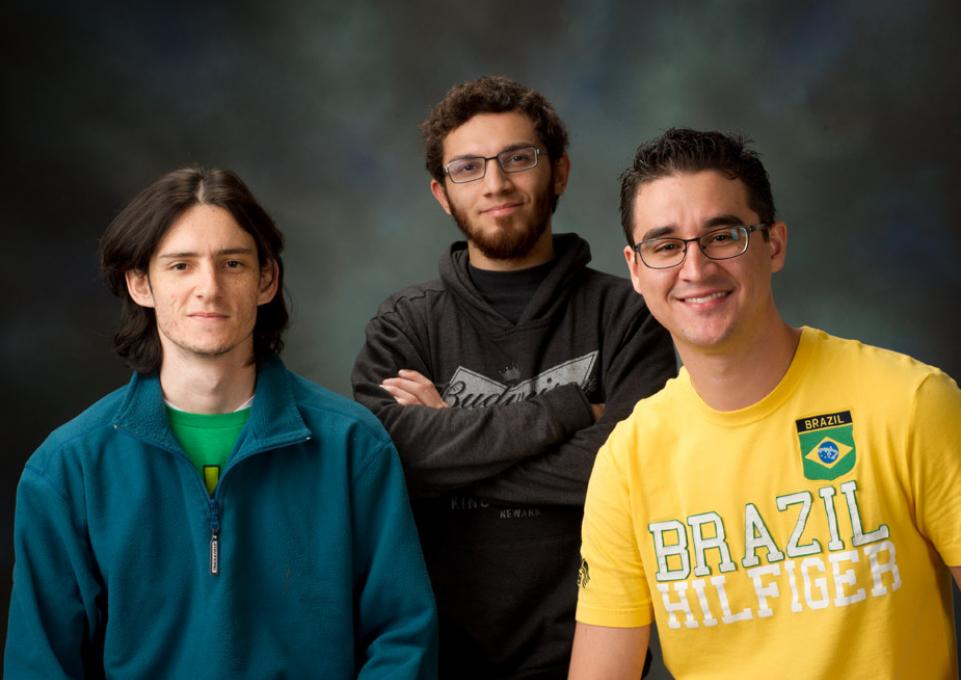
“Charming.” “Clean.” “Great weather.”
That’s how three students from Brazil are describing Buffalo State and its surrounding neighborhood. Rafael Rodrigues Manenti, Eduardo Almeida, and Fabricio Barbosa (pictured left to right) are undergraduate students who are taking part in Brazil’s new Science without Borders initiative. They arrived in January, and will study at Buffalo State for a year.
To be accepted into the competitive program, it took a lot of paperwork—“many letters of recommendation,” recalled Almeida—and satisfactory scores on the Test of English as a Foreign Language (TOEFL) test.
TOEFL scores indicate the ability of non-native-English speakers to succeed in an English-speaking academic environment. The students, who must be studying science, technology, engineering, or math (STEM programs) in a Brazilian university to take part in Science without Borders, can study in the United States for a year. The government of Brazil pays for their tuition, fees, books, living expenses, and transportation.
Buffalo State Issues Invitation
At the suggestion of Jean Gounard, director of the International Student Affairs Office, Buffalo State looked into becoming a host institution. According to Science without Borders, a host institution must offer strong coursework relevant to STEM fields, and must offer “excellent support services, appropriate housing, meal plan, and assistance in securing internships” to international students.
Mark Petrie, associate vice president for enrollment management, said that Buffalo State demonstrated its ability to meet both criteria. “We were able to point to our ability to provide a good experience for the students from Szechuan, China, who came here after the earthquake there disrupted their education,” he said. “Also, we want to provide our students with a more diverse learning environment, and one way to do that is to include students from many different countries.”
Buffalo State was easily able to provide the necessary coursework. Almeida, who is majoring in biotechnology at the Federal University of Pará in Brazil, is taking two relevant biology courses, genes in population and cell physiology. Fabricio Barbosa, a student at the Federal University of Goias, is an electrical engineering major who is enrolled in electrical engineering technology courses, microprocessors and electric machines. Manenti, who is studying geophysics at the Federal University of Bahia, is taking courses in ground-penetrating radar and environmental case studies.
Global Economics
All three students hope to improve their English while studying here. “With good English, you have more opportunities throughout the world,” said Almeida. Barbosa added that their experience here may benefit their careers. “Companies look with good eyes on someone who has studied abroad,” said Barbosa. “If you want to think globally, nothing is more important than studying abroad.”
They hope to secure internships this summer that will help them establish business relationships while gaining hands-on experience. Another priority for the trio is taking advantage of American technological know-how.
“We want to develop more of our own technology in Brazil,” Manenti explained. “We have many fine minds, and good professors.” Already, he believes, Brazilian technology is among the best in the world in deep-water drilling, and he hopes to work for an oil-drilling company someday. He has found the environmental case studies course especially valuable. “We are changing our geophysics program at the University of Bahia,” he said, “and I will suggest we include courses about environmental issues.”
Almeida said that adjusting to the style of teaching in American universities was a challenge, but worth it. “I like the way of teaching here,” he said. “They take the classes more seriously. You see students working in the library, even in the gym. We don’t have that in Brazil.” He has been very impressed with ANGEL, and the relative lack of bureaucracy.
All three students are optimistic, even excited, about Brazil’s future. “We have our problems,” said Barbosa, “but the next generations will be able to deal with them.
